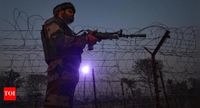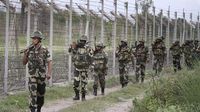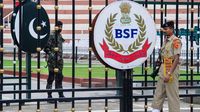A Border Security Force (BSF) jawan has been detained by Pakistan Rangers after accidentally crossing the International Border in Punjab. The incident, which occurred on April 23, 2025, involved Constable PK Singh of the 182nd battalion, who was on duty near farmland close to the Indo-Pak border.
According to reports, Singh was accompanying a group of Indian farmers when he inadvertently moved beyond the Indian border fence and entered Pakistani territory. While resting in the shade, he was apprehended by the Pakistan Rangers. A flag meeting is currently underway between the two forces to facilitate his early release.
This incident unfolds against a backdrop of heightened tensions between India and Pakistan, following a recent terror attack in Pahalgam, Jammu and Kashmir, which claimed the lives of 26 people, mostly tourists. The attack, which occurred on April 22, 2025, is considered one of the deadliest civilian massacres in the region in nearly two decades.
In response to the Pahalgam attack, India has implemented several diplomatic measures against Pakistan, including the suspension of the Indus Waters Treaty, the closure of the integrated check post at Attari, and the revocation of visas issued to Pakistani nationals. Indian authorities have also directed Pakistani citizens residing in India under the Special Visa Exemption Scheme to leave the country within 48 hours.
Foreign Secretary Vikram Misri addressed the media, stating that the cross-border connections to the Pahalgam attack were highlighted during a security cabinet meeting, leading to the decision to take action against Pakistan. He noted that the Indian government is committed to ensuring the safety and security of its citizens.
While such incidents of accidental border crossings by troops or civilians are not uncommon, the current political climate adds a layer of complexity to this particular case. Officials from both the Indian Army and Pakistan Rangers are engaged in dialogue to resolve the matter swiftly.
Singh, who was in uniform and carrying his service rifle, was reportedly on a routine patrol when the incident occurred. The BSF has confirmed that they routinely handle such situations through established military protocols, which typically involve repatriating detainees after procedural flag meetings.
In the wake of the Pahalgam attack, the Indian government has intensified military surveillance along the Line of Control and international borders. This heightened vigilance reflects India's ongoing concerns about terrorism and security in the region.
As the situation develops, both nations are watching closely. The incident has raised questions about the potential for further diplomatic fallout, as tensions remain high following the recent violence in Jammu and Kashmir.
In addition to the situation involving Constable Singh, there have been reports of ongoing military operations in Jammu and Kashmir. Earlier on April 24, 2025, Havaldar Jhantu Ali Shaikh of the 6 PARA Special Forces was killed during an encounter with terrorists in Udhampur district. This incident further underscores the volatile security situation in the region.
The Romeo Force of the Indian Army and the Special Operations Group (SOG) have been conducting joint operations in the forest area of Lasana in Jammu and Kashmir's Poonch district for the past ten days, following an exchange of fire with terrorists on April 14. The ongoing operations aim to track down militants believed to be hiding in the dense forest zones.
As the BSF and Pakistan Rangers continue their discussions regarding Constable Singh’s release, the broader implications of the Pahalgam attack and India's subsequent measures against Pakistan remain a focal point of concern for both governments. The situation is being closely monitored by military and diplomatic officials from both sides, with hopes for a peaceful resolution.
In summary, the accidental detention of BSF Constable PK Singh highlights the fragile nature of Indo-Pak relations, especially in the context of recent violent events. The ongoing flag meeting represents a critical step in addressing this incident, but it also reflects the larger challenges that persist in ensuring security and stability in the region.






